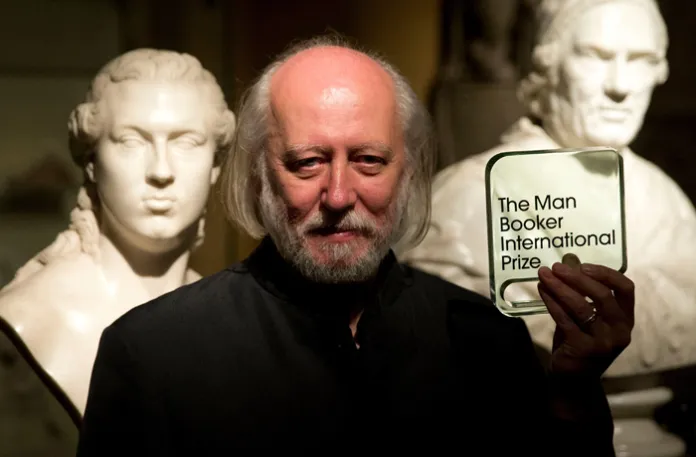The 2020s have been good to Hungarian intellectuals. In 2023, Katalin Karikó and Ferenc Krausz collected Nobel Prizes in Physiology or Medicine and Physics, respectively. David Szalay was recently shortlisted for a Booker. Now, László Krasznahorkai has won a Nobel Prize in Literature for a body of work that stretches back to the late Soviet era.
Karikó, Krausz, and Szalay all moved abroad, but Krasznahorkai still lives in a small Hungarian village, a reminder that our sharpest observers are often drawn from the periphery. Situated in the hinterlands of the old Soviet Empire and its NATO and European Union successors, Krasznahorkai is very far indeed from Moscow, Brussels, and New York.
Just what has Krasznahorkai picked up on from the fringes of the Western world? Admiring peers and laudatory reviewers often use the word “apocalyptic” to describe his books. Susan Sontag, an early booster, said Krasznahorkai was a “master of the apocalypse,” a phrase highlighted by the Nobel Committee in its survey of his career. A 2012 New York Times review of the English translation of Kraznahorkai’s first novel, Satantango, also mentions that word. The critical consensus suggests Krasznahorkai is a sort of literary Greta Thunberg.

“Decaying” would be a better adjective than “apocalyptic,” however. Having lived through the gray days of late communism and Hungary’s bumpy assimilation into the West’s political orbit, Krasznahorkai is well situated to write about systems under strain. It’s often difficult to determine when his books take place, whether it’s the late Habsburg era, the late Soviet period, or today’s Hungarian countryside, which is not experiencing a sudden collapse, but a slow, sad decline brought on by diminishing birth rates, crumbling infrastructure, and the gradual exodus of the young, the gifted, and the ambitious.
There is a certain timelessness to the rhythms and resentments of rural Hungary. Satantango, still Krasznahorkai’s best-known book, was first published in 1985 but is full of details that evoke village life in 1895, 1955, or 2005. The local big house is “the old Hochmeiss estate,” which could be an aristocrat’s manor home, an estate appropriated by the communists, or just a relic that can’t be maintained under Hungary’s austere transition to market capitalism. The book follows a group of credulous villagers who are taken in by a charismatic conman, a plot that would be immediately familiar to generations of Central and Eastern European readers.
Satantango’s atmosphere is one of pervasive neglect and decay. The local parks are falling apart. Once-thriving industries have fled. If this decline was brought on by a catastrophe, it was a catastrophe that took place far from the village, and its effects are only felt indirectly. An ambient sense of unease pervades the book, a feeling that things are gradually worsening with no obvious answers in sight.
In 1994, the book was adapted into a seven-and-a-half-hour black-and-white movie by Hungarian director Béla Tarr, who collaborated closely with Krasznahorkai on the script and production. The film seamlessly transposes Satantango’s late communist setting to the uncertain 1990s, when expectations about Central Europe triumphantly rejoining the West gave way to the realities of wrenching social and economic dislocation. One of the final scenes takes place inside a ruined church, where a madman rings the bell while shouting that the Turks are coming. As in Kraznahorkai’s books, historical eras seem to blend together in a miasma of confusion and uncertainty.
Satantango begins with an epigraph from Franz Kafka, and Krasznahorkai fits squarely in the lineage of Central European writers grappling with societies in decline. Just as Kafka was inspired by the bureaucratic frustrations of the late Habsburg Empire, Krasznahorkai’s books are marked by the final years of communism, which were mostly dull and depressing rather than oppressive. Krasznahorkai is often called a postmodern writer, and he surely enjoys experimentation (his latest novel includes only a single period), but his exploration of the surreal and the absurd brings to mind certain Central European antecedents.
MAGAZINE: REVIEW OF ‘STORYTELLER: THE LIFE OF ROBERT LOUIS STEVENSON’ BY LEO DAMROSCH
Milan Kundera, another writer with an eye for the absurd, sketched out several distinctly Central European qualities in his 1983 essay, “The Tragedy of Central Europe.” Central Europe, Kundera wrote, was composed of “small nations” whose fates are shaped by the whims of distant powers, much like the decaying village in Satantango, where misfortune has been brought on by remote and unexplained events. This sense of precarity also reflects the outsize cultural influence of Central Europe’s Jewish community, which Kundera called “the small nation par excellence.” Krasznahorkai surely understands this; he was born to a Jewish father who concealed his religious background from his son until he was 11. Kundera noted that the peoples of Central Europe are marked by a “‘nonserious spirit’ that mocks grandeur and glory” and a distrust of capital-H History. Krasznahorkai, who experienced the collapse of the Soviet empire and the disillusionment felt by many Hungarians during the post-communist transition period, also takes a dim view of grand narratives.
A few months before Krasznahorkai was awarded the Nobel, I interviewed a young Hungarian bike courier named Mark about the ins and outs of Budapest’s surprisingly cutthroat delivery market. Unprompted, he brought up “enshittification,” a term coined by technology writer Cory Doctorow to describe the gradual decay of digital spaces. I suspect Kraszahorkai has very little contact with the online world, and I doubt he’s ever ordered a pizza via a smartphone app. But he would surely understand Mark’s complaint. In a way, he’s been writing about it his whole life.
Will Collins is a lecturer at Eötvös Loránd University in Budapest, Hungary.

